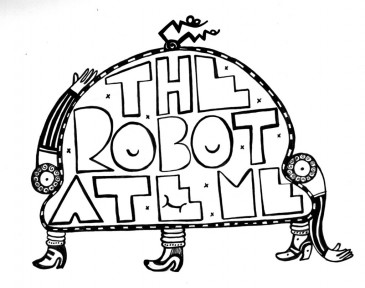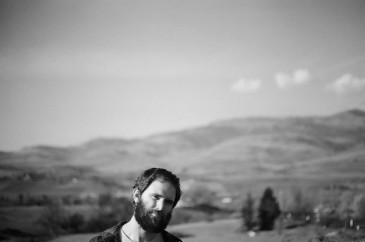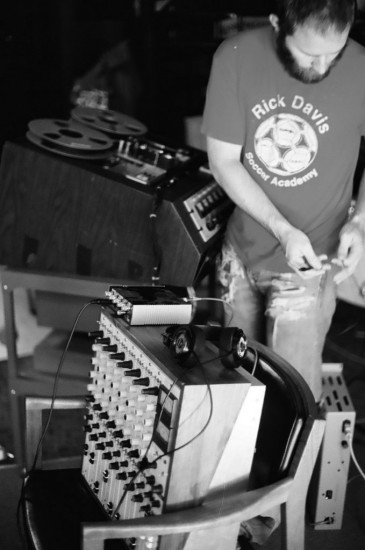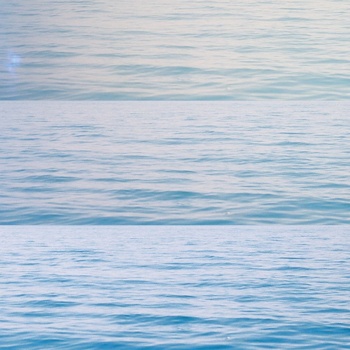
His musical project is called The Robot Ate Me, and after speaking with founder and frontman Ryland Bouchard, I wonder just what this robot left; a quiet, honest artist. A weirdo who is strikingly sane.
In 2002, Bouchard’s debut album They Ate Themselves was released on Swim Slowly — the Washington-based, Bouchard-founded label — and submerged the mental passages of those fortunate enough to flounder through it with multi-instrumental experimental folk/pop songs, rattling of apocalyptic-themed dreams, as poetic and stirring as they were grizzly. “Our Bones Were Chalk,” “Everyone Was Still,” “Goodnight (I Almost Died!)” — it was bizarre and captivating, it still is.
They Ate Themselves garnered some impressive attention and critical acclaim, though remained (most contently) below the volatile mainstream radar. Bouchard, with collaborative efforts, presented a mystifying array of haunting songs, some accessible and danceable, others challenging and obscure. For fans and for Bouchard, it’s hard to believe that was 11 years, and 11 releases ago. “It’s been a long time. It’s weird thinking back now. When you start working on music, you don’t think it’s something that’s going to last a long time,” muses Bouchard, on the line from his home in a small community on nearby Guemes Island, two hours north of Seattle.
Structurally and stylistically, Bouchard’s songwriting technique suggests an absence of context, thereby freeing each piece from constrictive accepted norms. “I never really listened to music when I was a kid, not till I was 14 or 15. Then I started playing music and didn’t ever really stop,” Bouchard recalls. “I think that really shaped me; when you approach things without context you have a better grasp of yourself. A lot of people end up making music just to copy what others have made. It’s easy to fall into that and it’s an artistic struggle for many.”

Copying what others have made is a non-issue for Bouchard, whose discography waxes and wanes through distinct, and palpable personal phases. “It’s all natural. I’ve never been able to sit down and consciously conceive a phase to enter. I could never record [2006’s] Good World again.”
In this way, Bouchard entered an engrossing and ultimately energy-vamping phase with the solo album/art endeavour Seeds in 2008. The hand-crafted box set consists of an A-sides collection on CD and vinyl, a B-sides CD, a DVD of Super 8 videos (Bouchard is also a talented filmmaker), four seven-inch vinyl records, letterpressed lyrics, a hand silkscreened shirt, bag, poster, and a set of illustrations.
Bouchard made 500 of these box sets.

“The albums represent different personal phases that I’ve been honest to without regard to commercial success. Most people would repeat what was successful, but I’ve never been interested in that.”
After years on the road, Bouchard has traded relentless touring as The Robot Ate Me to focus on songwriting, recording and filmmaking projects on lovely Guemes Island.
In January, Bouchard released the full-length Bridge by Bridge, followed just five days later by the EP Circumstance, both strictly digitally. To some this may seem inconsistent with the uncompromising battle to keep art legit, since critics like to poke holes through any potential weak spot in artistic values.

Bouchard offers, “If you’re self-releasing, digital is a nice opportunity. The physical aspects of a release are appealing aesthetically, but the practical applications aren’t positive. Compared to a tangible release, the cost is just so high and all that plastic sitting out in the world … It’s infinitely simpler when you remove the physical aspect and focus on the art itself. Getting caught up in the physical aesthetic is a kind of vanity.”
Bridge by Bridge is a very personal album for Bouchard, who has reoriented himself spatially and matured thematically. What was bizarre is not banal, but contemplative. What was spooky is serene. Some tracks are still ethereally layered, with Bouchard’s lace-like falsetto draped throughout simply structured tracks about love and loneliness, while others feel stripped down and bare to the soft marrow. The simplicity is magical.
As for live shows now, Bouchard has shied away from extensive touring, but a performance at Googly Eyes Studio here in Vancouver this summer is an exciting possibility.
Nearing the end of our conversation, Bouchard fancies, “There’s an important difference between an art project, and one being produced for your own gratification. I’ve seen the difference.” Seen the difference, and shown it.

